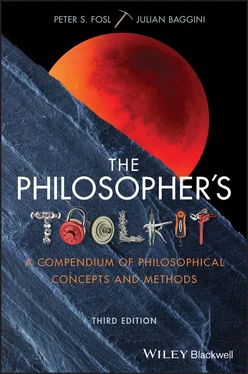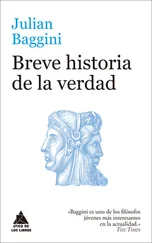1 ...6 7 8 10 11 12 ...16 Invalid arguments are not generally desirable machines to employ. They provide no guarantee whatsoever for the quality of the end product. You might put in good ingredients (true premises) and sometimes get a high‐quality result (a true conclusion). Other times good ingredients might yield a frustratingly poor result (a false conclusion).
Stranger still (and very different from sausage machines), with invalid deductive arguments you might sometimes put in poor ingredients (one or more false premises) but actually end up with a good result (a true conclusion). Of course, in other cases with invalid machines you put in poor ingredients and end up with rubbish. The thing about invalid machines is that you don’t know what you’ll get out. With valid machines, when you put in good ingredients (though only when you put in good ingredients), you have assurance. In sum:
Invalid argument
Put in false premise(s) → get out either a true or false conclusion
Put in true premise(s) → get out either a true or false conclusion
Valid argument
Put in false premise(s) → get out either a true or false conclusion
Put in true premise(s) → get out always and only a true conclusion
To say an argument is valid, then, is not to say that its conclusion must be accepted as true. The conclusion is definitely established as true only if both of two conditions are met: (1) the argument is valid and (2) the premises are true. This combination of valid argument plus true premises (and therefore a true conclusion) is called approvingly a sound argument. Calling it sound is the highest endorsement one can give an argument. If you accept an argument as sound, you are really saying that one must accept its conclusion. The idea of soundness can even itself be formulated as an especially instructive valid, deductive argument:
1 If the premises of the argument are true, then the conclusion must also be true (i.e. the argument is valid).
2 The premises of the argument are true.
3 Therefore, the conclusion of the argument must also be true.
For a deductive argument to pass muster, it must be valid. But being valid is by itself not sufficient to make it a sound argument. A sound argument must not only be valid; it must have true premises, as well. It is, strictly speaking, only sound arguments whose conclusions we must accept.
This may lead you to wonder why, then, the concept of validity has any importance. After all, valid arguments can be absurd in their content and false in their conclusions – as in our cheese and cats example. Surely it is soundness that matters?
Okay, but keep in mind that validity is a required component of soundness, so there can be no sound arguments without valid ones. Working out whether or not the claims you make in your premises are true, while important, is also not enough to ensure that you draw true conclusions. People make this mistake all the time. They forget that one can begin with a set of entirely true beliefs but reason so poorly as to end up with entirely false conclusions. It can be crucial to remember that starting with truth doesn’t guarantee ending up with it.
Furthermore, for the sake of launching criticisms, it is important to grasp that understanding validity gives you an additional tool for evaluating another’s position. In criticising a specimen of reasoning, you can either:
1 attack the truth of the premises from which he or she reasons,
2 or show that his or her argument is invalid, regardless of whether or not the premises deployed are true.
Validity is, simply put, a crucial ingredient in arguing, criticising, and thinking well, even if not the only ingredient. It’s an utterly indispensable philosophical tool. Master it.
1 1.1 Arguments, premises, and conclusions
2 1.2 Deduction
3 1.5 Invalidity
Aristotle (384–322 BCE). Prior Analytics
Fred R. Berger (1977). Studying Deductive Logic
S.K. Langer (2011). ‘Truth and validity'. In: Introduction to Symbolic Logic, 3rd edn, Ch. 1, pp. 182–90
* Jc Beall and Shay Allen Logan (2017). Logic: The Basics, 2nd edn
Given the definition of a valid argument, it may seem obvious what an invalid one looks like. Certainly, it’s simple enough to define an invalid argument: it is an argument where the truth of the premises does not guarantee the truth of the conclusion. To put it another way, if the premises of an invalid argument are true, the conclusion may still be false. Invalid arguments are unsuccessful deductions and therefore, in a sense, are not truly deductions at all.
To be armed with an adequate definition of invalidity, however, may not be enough to enable you to make use of this tool. The man who went looking for a horse equipped only with the definition ‘solid‐hoofed, herbivorous, domesticated mammal used for draught work and riding’ ( Collins English Dictionary ) discovered as much, to his cost. In addition to the definition, you need to understand the definition’s full import. Consider this argument:
1 Vegetarians do not eat pork sausages.
2 Gandhi did not eat pork sausages.
3 Therefore, Gandhi was a vegetarian.
If you’re thinking carefully, you’ll have probably noticed that this is an invalid argument. But it wouldn’t be surprising if you and a fair number of readers required a double take to see that it is in fact invalid. Now, this is a clear case, and if a capable intellect can easily miss a clear case of invalidity in the midst of an article devoted to a careful explanation of the concept, imagine how easy it is not to spot invalid arguments more generally.
One reason why many will fail to notice that this argument is invalid is because all three propositions are true. If nothing false is asserted in the premises of an argument and the conclusion is true, it’s easy to think that the argument is therefore valid (and sound). But remember that an argument is valid only if the truth of the premises guarantees the truth of the conclusion in the sense that because of the argument’s structure the conclusion is never false when the premises are true. In this example, this isn’t so. After all, a person may not eat pork sausages yet not be a vegetarian. He or she may, for example, be an otherwise carnivorous Muslim or Jew. He or she simply may not like pork sausages but frequently enjoy turkey or beef.
So, the fact that Gandhi did not eat pork sausages does not , in conjunction with the first premise, guarantee that he was a vegetarian. It just so happens that he was. But, of course, since an argument can only be sound if it’s valid, the fact that all three of the propositions it asserts are true does not make it a sound argument.
Remember that validity is a property of an argument’s structure of form. In this case, the form is:
1 All Xs are Ys.
2 Z is a Y.
3 Therefore, Z is an X.
Here X is substituted for ‘vegetarian’, Y for ‘person who does not eat pork sausages’, and Z for ‘Gandhi’. We can see why this structure is invalid by replacing these variables with other terms that produce true premises but a clearly false conclusion. (Replacing terms creates what logicians call a new ‘ substitution instance ’ of the argument form.) If we substitute ‘cat’ for X, ‘meat eater’ for Y, and ‘the president of the United States’ for Z, we get:
1 All cats are meat eaters.
2 The president of the United States is a meat eater.
3 Therefore, the president of the United States is a cat.
Читать дальше












